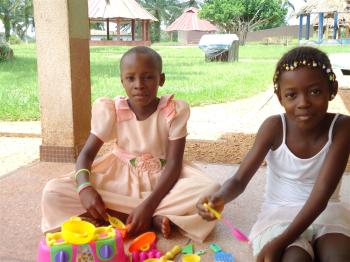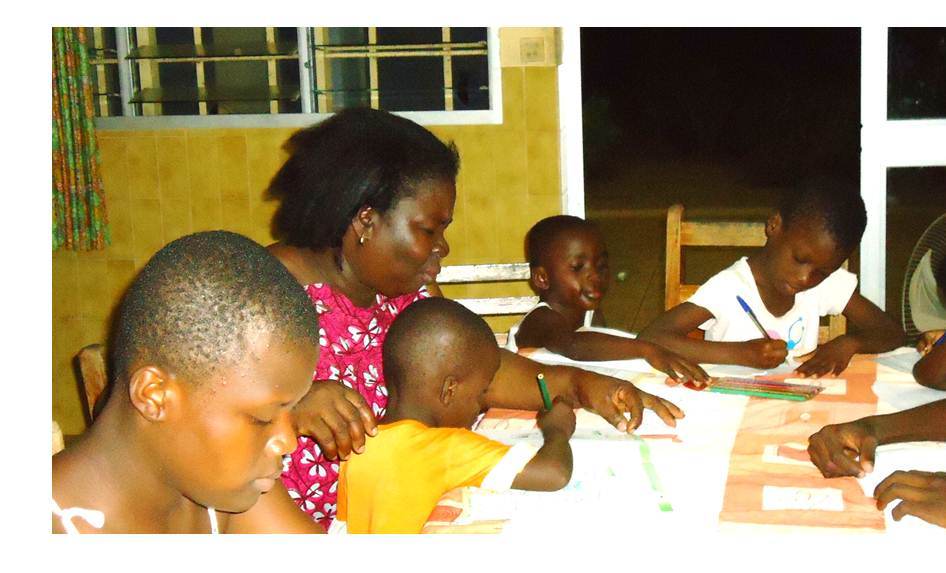Children’s rights are not sufficiently protected

Aboisso is a city of around 43,000 inhabitants located in the Sud-Comoé Region in south-eastern Côte d’Ivoire near the Ghanaian border. One of the reasons that SOS Children’s Villages began its work here in 1983 was the widespread traditional belief in the region that the tenth child would bring the family bad luck – these children were therefore frequently abandoned.
Today, women in Côte d’Ivoire have 4.4 children on average, and usually more in rural areas. Only 13 per cent use contraception and just 18 per cent have comprehensive knowledge of HIV/AIDS, according to UNICEF data. 20 per cent of girls are married and almost 30 per cent have their first baby before the age of 18. For many girls, marrying young seems like the only option for securing their livelihoods.
Especially in rural areas, girls often drop out of education to start a family with an older man who can provide financially. This makes the girls highly dependent on their husband or father of their children. In trying to escape poverty, young girls often end up in an even more precarious situation, especially when the man turns out to be unreliable. The political instability of the past decade has further aggravated the situation, as many schools had to close down and only gradually are pupils now returning to the classroom.
Due to its slightly better economy as compared to other western African countries, Côte d’Ivoire is not only a host country to migrant workers, but also the destination for trafficked children. Aboisso is located right along major trafficking routes, and many children end up here, mainly from Burkina Faso, Mali, Togo, Benin, Niger and Ghana. The children’s parents are promised an education and well-paid work for their child – which fails to materialise. Trafficked children are exploited, for example as domestic servants or working in the fields. Even if the children manage to escape their situation, they do not have the means to return to their country of origin and their family.
Holistic and sustainable support for a brighter future
Poverty means a lack of financial means to fulfil basic needs, as well as lacking access to basic goods and social services such as health care, education, or employment. But it is also a psychosocial phenomenon that leads to insecurity, exclusion, vulnerability and helplessness. It is therefore an important component of SOS Children’s Villages’ work in Aboisso to support families in bettering their situation, generating income, and providing for their children in a way that is sustainable and will allow them to be independent.
In recent years, there has been a growing need for support within the community as poverty levels are on the rise. The SOS Family Strengthening Programme, which we offer at our social centres, includes services such as HIV/AIDS awareness campaigns in the surrounding communities, and assistance for HIV/AIDS-affected people.
The family strengthening programme provides monthly food kits, medicine, school scholarships, single donations, and support with setting up self-help projects. We give health support, too, for example ensuring that children are vaccinated against meningitis and typhoid fever, and providing information on good personal and environmental hygiene.
What we do in Aboisso
_1.jpg)
For children from the region who can no longer live with their parents, ten SOS families can provide a loving home for up to 100 children. In each family, the children live with their brothers and sisters, affectionately cared for by their SOS mother.
The children attend the SOS Kindergarten together with children from the neighbourhood. This ensures that children from SOS families make friends and are integrated into the local community from a young age. The children then continue their primary education at the SOS Hermann Gmeiner School, which is attended by over 200 pupils.
When young people from the children’s village reach an age where they are ready to move out of the family home, the SOS Youth Programme makes shared accommodation available. Qualified SOS co-workers accompany and support the young people on their journey to becoming independent adults, for example by providing guidance and support in finding employment or training opportunities.